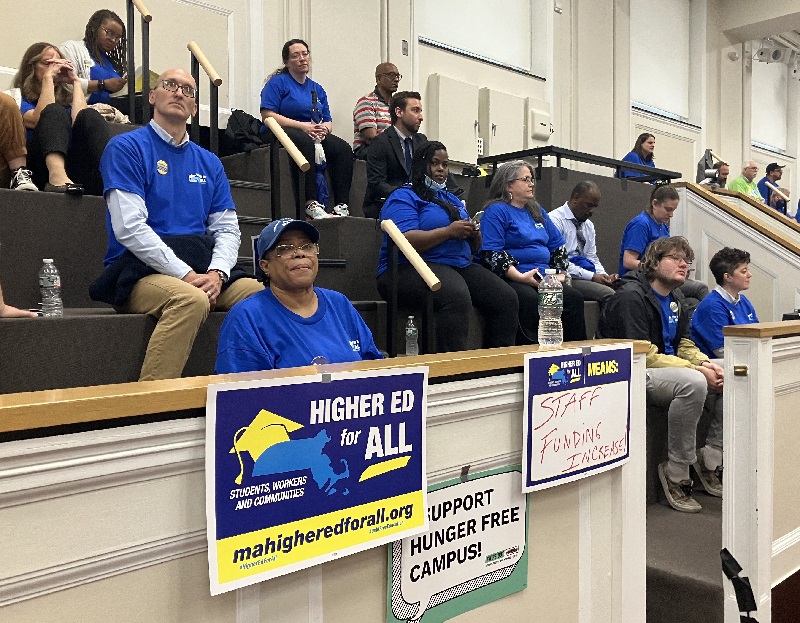latest
Debt-free college in Massachusetts framed as cure for workforce woes

By Alison Kuznitz
STATE HOUSE, BOSTON, SEPT. 18, 2023…..Tens of thousands of Bay Staters struggling to afford skyrocketing college tuition, compounded by inflation that’s driving up rent and other daily costs of living, would gain a more affordable path to public higher education through legislation that received resounding support Monday but comes with a hefty price of nearly $800 million.
Advocates told the Joint Committee on Higher Education the so-called CHERISH Act represents Beacon Hill’s next opportunity to pursue major educational investments, shifting the Legislature’s emphasis on K-12 education in recent years to give a fresh look at public state colleges, including the University of Massachusetts system, and community colleges.
The proposals sponsored by Reps. Sean Garballey and Patricia Duffy and Sen. Jo Comerford, the co-chair of the committee, would launch a debt-free college scholarship program that reflects the full scope of higher education expenses, including tuition, fees and living expenses like food and housing. It would also provide $2,000 per eligible student — including vulnerable individuals who are first-generation, disabled or members of the LGBTQ community — for peer mentoring, advising, tutoring and other support services.
“Our goals are a more educated workforce, increased earnings and investing in the economic strength of our commonwealth, resulting in a more competitive commonwealth and affordable state,” Garballey, a committee member, said at the hearing.
Members of the Higher Ed for All Coalition, who filled Gardner Auditorium, said the return on investment from the CHERISH Act will yield a more diverse workforce as students from low-income and marginalized communities are able to complete their two- or four-year degrees, plus certificate programs — without needing to drop out due to financial barriers or incurring massive debt.
Their testimony echoed a report published by the Hildredth Institute last week that outlined a drop in immediate college enrollment, particularly for low-income high school graduates, due to the student debt crisis and ballooning costs.
Ben Forman, research director at MassINC, signaled the legislation could blunt a forecast — released by the nonprofit think tank last June — that the state’s working-age, college-educated workforce could shrink by about 200,000 people by 2030, which he said is “completely uncharted territory.”
Forman said lower-income people have less opportunity than past generations to afford attending higher education, a problem that’s more acutely affecting regional economies outside of Boston and in Gateway Cities.
“Those places depend much more on public higher ed, and they are losing graduates at a faster pace,” Forman said at the hearing. “If they don’t have a highly skilled workforce, they’re going to have more challenges.”
Coalition members argued the legislation is crucial to reverse decades of declining state support for higher education, with the Massachusetts Budget and Policy Center reporting a nearly 30 percent drop in funding — translating to $500 million — since 2001 when adjusted for inflation, according to a new analysis released Monday.
Colin Jones, the MassBudget senior policy analyst who wrote the report, told lawmakers the CHERISH Act would cost around $790 million. But he indicated those investments could be phased in through a multi-year approach that’s similar to the six-year rollout of the Student Opportunity Act.
While state officials cannot directly tackle federal student loan debt that Massachusetts residents have already incurred, Jones said the “state can take the lead on the front end, making (college) affordable so people don’t have to take out loans in the first place.”
“When it comes to CHERISH, it’s a really, really generous grant program,” Jones said.
The legislation would implement “fair and adequate” minimum funding levels for public higher education; provide health care and retirement benefits for adjunct faculty and part-time staff; establish a wage equity commission to help recruit and retain employees at public colleges and universities; and make the state cover debt service obligations tied to capital projects and future construction, among other parameters, according to a summary from Comerford’s office.
Max Page, president of the Massachusetts Teachers Association, emphasized that connecting students to debt-free higher education is not enough as he urged lawmakers to not forget about the “quality side of the equation.”
“If you send them to underfunded institutions where adjuncts are exploited, where the buildings are falling apart, and students are expected to pay for them … that’s another form of racism and classism,” said Page, a professor at UMass Amherst, which he said has seen a rapid drop in the number of full-time or tenured faculty members due to budget cuts.
Eric Parkison, an adjunct professor at Bunker Hill Community College and other institutions, asked lawmakers to overhaul what he described as a “mainly miserable situation.” Despite more than a decade of adjunct teaching — sometimes at three or four schools in a semester — Parkison said he hasn’t been considered for a full-time position, meaning he hasn’t accrued any retirement savings or received employer-sponsored health care.
“Even after a good semester, I feel ashamed of what little has come from my investment in my education,” Parkison said. “The funding that the CHERISH Act seeks would get me closer to dignified working conditions.”
-

 Community7 years ago
Community7 years agoNational Shrine of La Salette Festival of Lights 2017 set to begin
-

 Community6 years ago
Community6 years agoMassachusetts State Police looking for good home for retired dogs
-

 Crime6 years ago
Crime6 years agoFall River ranked most dangerous city in Massachusetts according to report
-

 latest7 years ago
latest7 years agoDurfee student allegedly overdoses on marijuana
-

 Community6 years ago
Community6 years agoVideo of Fall River Police goes viral
-

 Causes6 years ago
Causes6 years agoMissing Fall River woman found deceased
-

 Crime7 years ago
Crime7 years agoFall River Police add names to most wanted list
-

 Causes6 years ago
Causes6 years agoFall River teenager reported missing has been found





AbortionsForEveryone
September 20, 2023 at 9:42 pm
“Free Everything” in Massachusetts!